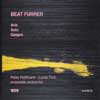Furrer Aria for Soprano and Cello; Cello Works; Chamber Works
Intriguing works from the Swiss-born Furrer could contain a new-music classic
View record and artist detailsRecord and Artist Details
Composer or Director: Beat Furrer
Genre:
Chamber
Label: Kairos
Magazine Review Date: 8/2003
Media Format: CD or Download
Media Runtime: 53
Mastering:
Stereo
DDD
Catalogue Number: 0012322KAI

Tracks:
| Composition | Artist Credit |
|---|---|
| Aria |
Beat Furrer, Composer
Beat Furrer, Composer Petra Hoffmann, Soprano Recherche Ensemble |
| Solo |
Beat Furrer, Composer
Beat Furrer, Composer Lucas Fels, Cello |
| Gaspra |
Beat Furrer, Composer
Beat Furrer, Composer Recherche Ensemble |
Author: kYlzrO1BaC7A
Active as both composer and conductor (he founded the new-music group Klangforum Wien in 1985), Swiss-born Beat Furrer has assembled a range of works attesting to an imaginative and fastidious musical mind. The latest disc from Kairos confirms his essentially inward-looking, though far from detached, sensibility, and features one work which could well become a classic of its medium.
That work is Solo (2000), an extended soliloquy for cello in which musical contrast is ensured by the separating out of ideas played by the left and right hands. That the piece evolves as purposefully as it does is due partly to the small but distinctive pitch content of the material, and partly the care with which Furrer intercuts that material with unrelated figures appropriate to the stage the piece has reached. By the close, the work is so preoccupied with recollections as to have lost its identity, a factor which places it in the company of touchstones of the modern repertoire by Zimmermann, Lachenmann and Ferneyhough. Lukas Fels plays with the dedication such music warrants.
Aria (1999) uses many of the same gestures to totally different ends. The text tells of the emotional distancing effected by a woman at the end of a relationship – though the obliqueness of the vocal writing and its assimilation into the ensemble means that overall coherence is of the timbral rather than semantic kind, to which the voice’s reiterations of pitch are a constant point of reference. Petra Hoffmann finds a striking pathos in her contribution, and Ensemble Recherche sound at one with the music both here and in Gaspra (1988).
The latter, involving the interplay of solos, duos and trios, is the first work where Furrer derived music through a refinement of ‘noise’, though the progress from one defining rhythmic pattern to another over the course of the work feels a little too pre-ordained to evoke the aimless wondering of the asteroid whose name provided the title.
Clear and well-balanced sound, and detailed notes in the customary Kairos manner. Intriguing and often thought-provoking music which will reward the attention of those willing to listen.
That work is Solo (2000), an extended soliloquy for cello in which musical contrast is ensured by the separating out of ideas played by the left and right hands. That the piece evolves as purposefully as it does is due partly to the small but distinctive pitch content of the material, and partly the care with which Furrer intercuts that material with unrelated figures appropriate to the stage the piece has reached. By the close, the work is so preoccupied with recollections as to have lost its identity, a factor which places it in the company of touchstones of the modern repertoire by Zimmermann, Lachenmann and Ferneyhough. Lukas Fels plays with the dedication such music warrants.
Aria (1999) uses many of the same gestures to totally different ends. The text tells of the emotional distancing effected by a woman at the end of a relationship – though the obliqueness of the vocal writing and its assimilation into the ensemble means that overall coherence is of the timbral rather than semantic kind, to which the voice’s reiterations of pitch are a constant point of reference. Petra Hoffmann finds a striking pathos in her contribution, and Ensemble Recherche sound at one with the music both here and in Gaspra (1988).
The latter, involving the interplay of solos, duos and trios, is the first work where Furrer derived music through a refinement of ‘noise’, though the progress from one defining rhythmic pattern to another over the course of the work feels a little too pre-ordained to evoke the aimless wondering of the asteroid whose name provided the title.
Clear and well-balanced sound, and detailed notes in the customary Kairos manner. Intriguing and often thought-provoking music which will reward the attention of those willing to listen.
Discover the world's largest classical music catalogue with Presto Music.

Gramophone Digital Club
- Digital Edition
- Digital Archive
- Reviews Database
- Full website access
From £8.75 / month
Subscribe
Gramophone Full Club
- Print Edition
- Digital Edition
- Digital Archive
- Reviews Database
- Full website access
From £11.00 / month
Subscribe
If you are a library, university or other organisation that would be interested in an institutional subscription to Gramophone please click here for further information.




